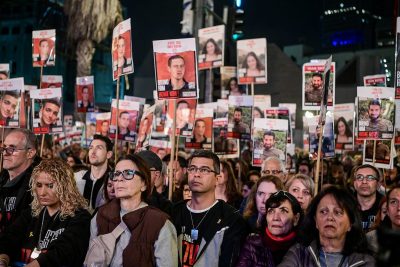×


We have detected your country as:
Please click here to go to the USA website or select another country from the dropdown list.
by: Joshua Marks ~ JNS

Israelis attend a rally calling for the release of Israelis held kidnapped by Hamas terrorists in Gaza at “Hostage Square” in Tel Aviv.
Monday, 26 February 2024 | Israel’s War Cabinet on Saturday night approved the travel to Doha, Qatar in the coming days of a delegation to continue ceasefire talks, after “significant progress” was reported at a Paris summit over the weekend.
The decision was made after a phone consultation in which government ministers received an update on the negotiations in the French capital, that also involved American, Egyptian and Qatari interlocutors.
The Friday and Saturday meetings built on last month’s initial gathering in the French capital as well as intermittent talks in Cairo aimed at realizing a proposal to free the remaining 134 Israelis being held by Hamas in exchange for an extended pause in the war.
The same players from the January 28, Paris summit, and who met in Cairo on February 13, were in the French capital for the latest round of talks—David Barnea, director of Israel’s Mossad intelligence agency, CIA director Bill Burns, head of Egyptian intelligence Maj. Gen. Abbas Kamel and Qatari Prime Minister and Foreign Minister Mohammed bin Abdulrahman bin Jassim Al Thani.
An Israeli political official familiar with the details of the negotiations struck an optimistic tone, telling Channel 13 that there was “significant progress in the talks—one that creates conditions for a deal.”
Another senior Israeli official, however, cautioned that “we are still far away from a deal but Hamas caved on some of its demands,” reported Axios.
Echoing that an agreement was not imminent, a senior US official told Axios that there was “some progress made in the hostage talks in Paris on Friday, but [that there was more way] to go to get a deal.”
The parties reportedly want to close the deal in the next two weeks, before the start of Ramadan [one of the Five Pillars of Islam, a fasting month observed by Muslims worldwide], beginning on March 10.
However, Hamas has yet to weigh in on the updated framework.
After the Paris summit, Taher al-Nunu, media adviser to Hamas politburo chief Ismail Haniyeh, emphasized that the terrorist group was not giving up on its core demand for a permanent end to the war.
“We will not give up on stopping the war and a complete withdrawal of the Israel Defense Forces [IDF] from the Gaza Strip,” said al-Nunu.
Senior Hamas official Abdel Rahman Shadid told a Qatari television channel on Saturday that “the discussions in Paris are nothing more than self-negotiations because Hamas is not part of them.”
He added that Israeli Prime Minister Benjamin Netanyahu’s “statements send clear messages that Israel is not serious about making progress regarding the exchange deal. We are not part or party to the Paris meetings and have not been informed of any progress.”
Jerusalem, for its part, has not changed its stated war aims of eliminating the terrorist group in Gaza, returning all hostages and ensuring that the enclave never again poses a threat to Israeli citizens.
On Saturday, Netanyahu said that at the start of the week, he would “convene the Cabinet to approve the operational plans for action in Rafah, including the evacuation of the civilian population from there.”
Netanyahu has repeatedly emphasized that the defeat of Hamas in Gaza cannot be achieved without a military incursion into the southern city, home to the final four Hamas battalions along with smuggling tunnels fueling the Strip’s militarization.
According to reports, the current framework agreement includes in the first stage the release of 35 to 40 children, women, adults over the age of 60 and the sick in exchange for a ceasefire of some six weeks involving the redeployment of troops within Gaza, but not a total withdrawal of Israeli forces as Hamas demands. Notably, Jerusalem would not commit to ending the war. Furthermore, a few hundred terrorists in Israeli prisons would be released and Palestinian women and children would be allowed to return to northern Gaza.
During the initial phase, negotiators would work at securing a larger deal, similar to what occurred in the first hostage agreement in late November, which started with 50 hostages being freed and ended with the release of over 100.
Channel 13 reported that the War Cabinet also approved expanded negotiating powers for Barnea and his team to take to the Qatari capital for further talks, including the introduction of more humanitarian aid into Gaza. This represents a broader mandate for the Doha talks compared to what was more of a listening session in Cairo.
“Only a combination of military pressure and tough negotiations will lead to the release of our hostages, the elimination of Hamas and the achievement of all the war’s objectives,” Netanyahu said on Saturday.
The terrorist group initiated the war on October 7 when it led a mass invasion into southern Israel, murdering 1,200 people, wounding thousands more and kidnapping 253 others. Widespread atrocities were reported on that day, including rapes, beheadings, burning babies, torture, mutilations and desecration of corpses, as well as looting and property destruction.
Posted on February 26, 2024
Photo Credit: Avshalom Sassoni/Flash90/jns.org
All logos and trademarks in this site are property of their respective owner. All other materials are property of Bridges for Peace. Copyright © 2024.
Website Site Design by J-Town Internet Services Ltd. - Based in Jerusalem and Serving the World.